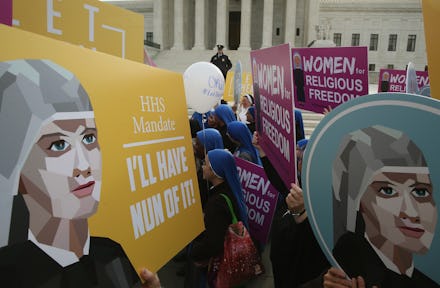A Philly foster agency can continue discriminating against LGBTQ families, SCOTUS rules

In a surprise decision on Thursday by the United States Supreme Court, all nine Justices agreed that Philadelphia's Catholic Social Services agency may continue its contract with the city to help place children in foster homes, even after the group was accused in 2018 of refusing to serve same-sex families.
Writing the opinion for the case, officially Fulton v Philadelphia, Chief Justice John Roberts noted that because Philadelphia has exceptions for other agencies with which it contracts, a similar exemption must be made for Catholic Social Services — despite its anti-LGBTQ policy being in direct opposition to the city's laws against discrimination.
"As Philadelphia acknowledges, CSS has 'long been a point of light in the City’s foster-care system,'" Roberts wrote. "CSS seeks only an accommodation that will allow it to continue serving the children of Philadelphia in a manner consistent with its religious beliefs; it does not seek to impose those beliefs on anyone else. The refusal of Philadelphia to contract with CSS for the provision of foster care services unless it agrees to certify same-sex couples as foster parents cannot survive strict scrutiny, and violates the First Amendment."
The court's decision comes more than three years after a Philadelphia Inquirer story first highlighted Catholic Social Services' refusal to place foster children with same-sex families.
While Thursday's ruling gave the appearance of unanimity in convictions among the justices, the decision ultimately highlighted a deep division within the court. While the liberal justices agreed that in this instance, Philadelphia had overstepped its bounds in prohibiting CSS from serving as a contracted agency, the court's conservative members hinted at a desire to go even further by overturning 1990s Employment Division v. Smith — which established a precedent by which "neutral and generally applicable law" takes precedence over religious liberty hardships.
"Today's decision will be of no help in other cases involving the exclusion of faith-based foster care and adoption agencies unless by some chance the relevant laws contain the same glitch as the Philadelphia contractual provision on which the majority’s decision hangs," Conservative Justice Samuel Alito wrote in a concurring opinion. "The decision will be even less significant in all the other important religious liberty cases that are bubbling up."
"We should reconsider Smith without further delay," he added.
Writing a second concurring opinion, Justice Neil Gorsuch agreed, saying "these cases will keep coming until the Court musters the fortitude to supply an answer [to the questions posed by Smith.] Respectfully, it should have done so today."
That the court didn't do so only means that conservatives will likely continue bringing cases like this, in the hopes of ultimately overturning Smith, and establishing a new set of precedents that will allow for further discrimination and anti-LGBTQ policies, all couched in the language of "religious freedom." And given the current hard-right tilt of the Supreme Court, there's plenty of reason to believe they can do it, too.